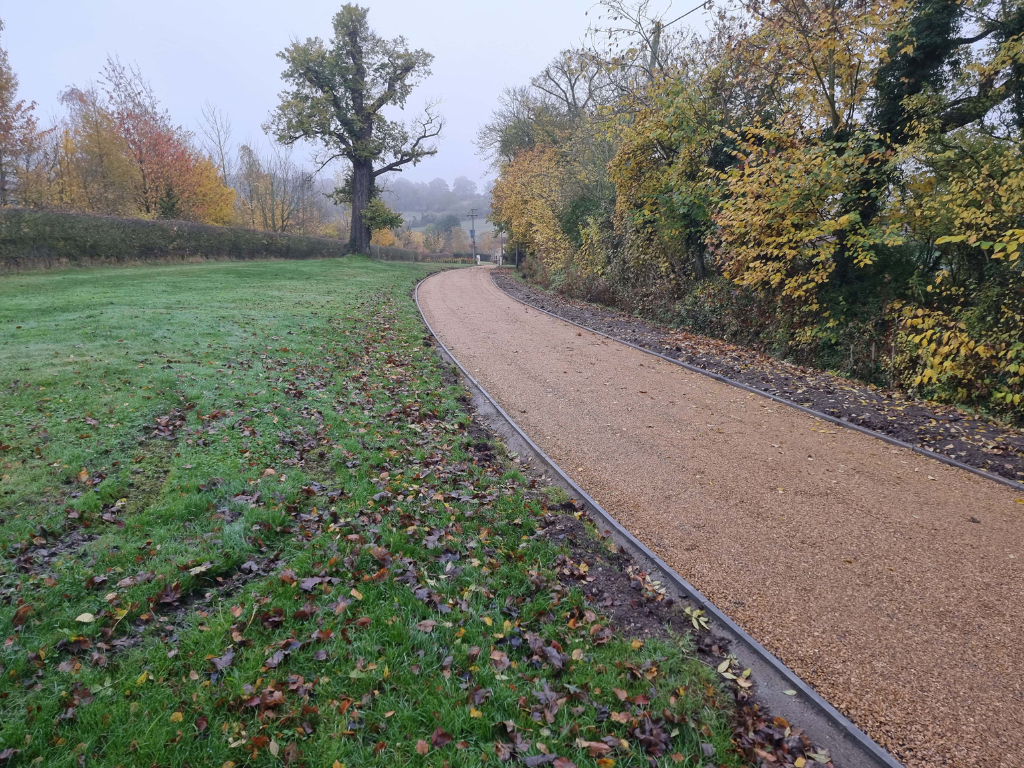Tar & Chip Pathways: Why They’re Perfect for Countryside Living
Introduction
When it comes to enhancing access around rural properties, few surfacing options strike the perfect balance between practicality and charm quite like tar and chip. In countryside areas like Lowestoft, Suffolk, homeowners are increasingly turning to this traditional yet highly effective method for their pathways, driveways, and garden tracks.
At Lowestoft Driveway Solutions, we’ve worked with a wide range of surfacing materials, and tar and chip continues to stand out for its durability, visual appeal, and suitability for rural settings. This blog explores why tar and chip pathways are the ideal choice for countryside living and how they can transform your property with both function and finesse.
What Is a Tar & Chip Pathway?
Tar and chip, also known as chip seal, involves applying a hot layer of bitumen (tar) to a prepared base, followed by a layer of loose stone aggregate. The stones are then rolled into the surface, creating a natural, textured finish that offers excellent grip and aesthetic appeal.
Key Characteristics
- Rustic, natural appearance
- Durable and weather-resistant
- Excellent traction underfoot
- Low maintenance over time
Tar and chip pathways blend effortlessly into rural landscapes, making them a popular alternative to asphalt or block paving in countryside environments.
Benefits of Tar & Chip in Rural Settings
Complements the Countryside Aesthetic
One of the standout features of tar and chip pathways is their visual compatibility with rural surroundings. The gravel finish softens the look of man-made structures and integrates beautifully with natural landscapes, cottages, barns, and gardens.
- Natural stone colours enhance rustic appeal
- Blends seamlessly with lawns, hedges, and trees
- Avoids the harsh appearance of black tarmac
Cost-Effective and Efficient Installation
Compared to block paving or fully tarmacked paths, tar and chip is more affordable to install. It requires less material depth and can be laid quickly, which makes it ideal for longer access tracks and meandering garden paths.
- Lower material and labour costs
- Quicker turnaround with minimal disruption
- Suitable for large rural properties
Long-Lasting Performance
Tar and chip is highly resilient to British weather conditions, including rain, frost, and UV exposure. The compacted stone surface provides a stable walking path that doesn’t become slippery or waterlogged, even during the wetter months.
- Excellent drainage properties
- Durable in high-footfall or light vehicle areas
- Resistant to cracking and potholing
Low Maintenance Requirements
Unlike gravel, which can shift and scatter, the chip layer in tar and chip pathways is bonded securely to the bitumen. This prevents rutting and keeps the surface neat with minimal upkeep.
- Occasional top dressing can refresh appearance
- No need for regular weeding or levelling
- Easy to patch if needed without replacing the whole surface
Common Uses Around Countryside Homes
Garden Walkways
Tar and chip creates defined paths that are safe, attractive, and easy to maintain—ideal for garden strolls and flowerbed access.
Driveways and Courtyards
For rural homes with longer drives or large courtyards, tar and chip is a practical surfacing solution that handles light vehicular traffic without compromising the property’s character.
Farm Tracks and Field Access
The durability and grip of a tar and chip surface make it well-suited to agricultural settings where vehicles and foot traffic are common.
Heritage Properties
Period homes benefit from a surface that reflects traditional charm while offering modern reliability.
Customisation Options
Tar and chip pathways can be tailored to your preferences, with a range of stone sizes and colours available to match the tone of your property.
- Light grey, buff, or rustic red stone options
- Choice of fine or coarse chip finishes
- Edge detailing and border options to enhance design
At Lowestoft Driveway Solutions, we work closely with homeowners to ensure the finish complements the property’s surroundings and meets functional needs.
The Installation Process
Site Preparation
We begin by grading and compacting the base layer to ensure proper drainage and stability. This is especially important for rural sites with uneven ground or variable soil conditions.
Application of Tar and Chip
Hot tar is applied evenly over the base, followed by a layer of clean, dry stone chip. The surface is then rolled to embed the stones and seal the layer in place.
Final Finishing
Once cooled, the pathway is ready for use—typically within 24 hours. Additional top layers can be added later if needed for aesthetic or wear purposes.
Conclusion
Tar and chip pathways offer a blend of durability, charm, and cost-efficiency that makes them ideal for countryside living. Whether you’re enhancing access to your home, improving garden paths, or upgrading a farm track, this surfacing solution provides long-term value with minimal maintenance.
If you’re based in or around Lowestoft, Suffolk, and want to explore how tar and chip pathways can elevate your rural property, contact Lowestoft Driveway Solutions. Our team delivers professional, tailored surfacing installations that complement your lifestyle and landscape perfectly.
Call us on: 01502 447 997
Click here to find out more about Lowestoft Driveway Solutions
Click here to complete our contact form and see how we can help with your driveways.

